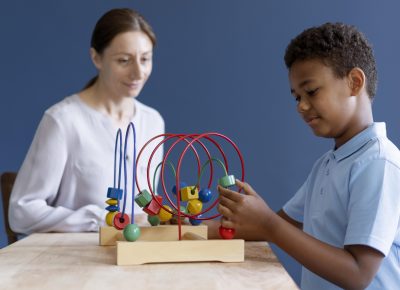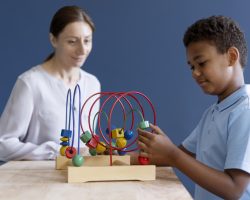Author Archives: addvantages
The NVLD & NeuroDivergent Pioneer

Linda Talks about NVLD, ADHD on the SuccessFULL with ADHD Podcast with Brooke Schnittman!
Linda Karanzalis NVLD ADHD Podcast: We are excited to share insights from our recent discussion with Linda Karanzalis, a nationally recognized cognitive specialist and advocate for Nonverbal Learning Disorder (NVLD). Linda’s mission is to spread awareness about NVLD, a condition often misunderstood and misdiagnosed as ADHD, autism, or other learning challenges.
What is NVLD?
NVLD is a brain-based learning disorder characterized by difficulties in visual-spatial processing, motor skills, and social interactions despite strong verbal abilities. This unique profile can lead to challenges in communication, academic settings, and the workplace.Key Highlights from Our Discussion:
-
Linda shares her journey growing up with NVLD, offering a firsthand perspective on the struggles and triumphs associated with the disorder.
-
Differentiating NVLD from Autism and ADHD: Linda explains how NVLD differs from other conditions, emphasizing the importance of accurate diagnosis for effective support.
-
Advocacy and Awareness: Through her work and her book, “Misnamed, Misdiagnosed, Misunderstood,” Linda aims to foster empathy and understanding for those who think and learn differently.
NVLD Expert Linda Karanzalis, MS, BCCS

 Linda Karanzalis, MS
Linda Karanzalis, MS
Linda Karanzalis, MS, is a former special education classroom teacher with over 25 years of experience in learning disabilities, ADHD, social-emotional learning, social skills training, and behavior management.
Communication Tips for NVLD and its Neurodivergents of All Ages (Parents, teach these skills to your children!)

Communication tips for NVLD and neurodivergents :I get it—having NVLD and ADHD means facing communication challenges. But here’s the good news: those struggles have taught me so much about connection, patience, and growth. Let’s explore some simple, effective tips to make communication feel easier and more rewarding.
Do You Feel Left Out of Conversations?
Do you or your child struggle to pick up on social cues, body language, or tone of voice? Do conversations sometimes leave you feeling confused or excluded? If so, you’re not alone.
Neurodivergent individuals, including those with Nonverbal Learning Disorder (NVLD), often find it difficult to interpret verbal and nonverbal communication together. But communication isn’t just an innate ability—it’s a skill that can be learned! This guide will help you develop strategies to navigate conversations with more confidence and ease.
Communicating with Clarity and Confidence
🔹 Be Clear and Direct – Many people, especially neurodivergents, communicate best when things are straightforward. Use this to your advantage! Avoid vague language or relying on nonverbal cues. Instead, use direct communication when confused, such as: “I need your help understanding this.”
🔹 Take Your Time – Everyone processes information differently. You may need extra time to think before responding or ask follow-up questions to clarify meaning. It’s okay to pause and revisit the conversation later. Try saying: “I need to think about this more. I’ll get back to you later.”
🔹 Ask Instead of Assuming – If something feels unclear, don’t guess—ask! A simple “Did I explain that clearly?” or “How do you feel about what I just said?” can prevent misunderstandings and keep conversations on track.
Real Talk: A Quick Scenario
🚦 Situation: A friend says, “Wow, that’s a bold choice.”
🤔 Challenge: Are they being sincere, sarcastic, or just making an observation?
✅ Solution: Instead of assuming, ask: “What do you mean by bold?” or “Do you like it?” This encourages clarification while keeping the conversation natural.
Practice Makes Progress
Think about past situations where communication felt challenging. Write down possible responses in advance to use next time!
Small Steps, Big Wins
💡 Social skills improve with practice! The more you use these strategies in daily conversations—whether with family, friends, or coworkers—the more natural and confident you’ll feel in social interactions
.
NVLD Expert Linda Karanzalis, MS, BCCS

 Linda Karanzalis, MS
Linda Karanzalis, MS
Linda Karanzalis, MS, is a former special education classroom teacher with over 25 years of experience in learning disabilities, ADHD, social-emotional learning, social skills training, and behavior management.
Linda Karanzalis, MS, BCCS, Sheds Light on This Invisible Disability in Her New Book; Misnamed, Misdiagnosed, Misunderstood

The Price of Business Digital Network has a new series of outstanding commentaries from thought leaders. This is one in that series.
NVLD Expert Linda Karanzalis, MS, BCCS

For more great lifestyle content see here.
LISTEN TO THE INTERVIEW IN ITS ENTIRETY HERE: Identifying NVLD Symptoms in Children
 Linda Karanzalis, MS
Linda Karanzalis, MS
Linda Karanzalis, MS, is a former special education classroom teacher with over 25 years of experience in the areas of learning disabilities, ADHD, social-emotional learning, social skills training, and behavior management
Could You or Your Child Have NVLD? Demystifying This Little-Known Learning Disorder

INTERVIEW ON THE PRICE OF BUSINESS SHOW, MEDIA PARTNER OF THIS SITE.
Nonverbal learning disorder (NVLD):Recently, Kevin Price, host of the nationally syndicated Price of Business Show, interviewed Linda Karanzalis, MS, BCCS, a leading expert on Nonverbal Learning Disorder (NVLD) and neurodivergence, as part of her ongoing commentary series.The Linda Karanzalis Commentaries
Millions of intelligent individuals—children to seniors—struggle with a little-known, invisible neurodevelopmental communication disorder called Nonverbal Learning Disorder (NVLD). These individuals, often high-achieving or with average to high IQs, face difficulties in social interactions and understanding nonverbal cues, despite their articulate nature. NVLD is often misnamed, misunderstood, and frequently misdiagnosed, making accurate diagnosis critical for helping individuals reach their full potential.Why Awareness of NVLD Matters
By learning more about NVLD, you can better support yourself, your children, students, patients, or colleagues who may be dealing with this condition. Listen to Linda’s commentary for valuable insights into this invisible disability.About Linda Karanzalis
Linda Karanzalis, a Board-Certified Cognitive Specialist, is the author of Misnamed, Misdiagnosed, Misunderstood, a new book focused on NVLD and other brain-based challenges. Dr. Ned Hallowell, a world-renowned ADHD expert, has praised her work, calling it “vivid, compelling, and full of heart.” Having NVLD and ADHD herself, Linda has spent over 25 years working with individuals of all ages who have NVLD, ADHD, learning disabilities, and are on the autism spectrum. As an author, speaker, and learning specialist, she offers validation, awareness, and compassionate strategies for thriving with neurodiversity. Find out more about Linda’s journey and her book at www.lindakaranzalis.com.Follow Linda Karanzalis through her social media accounts:

Join the NVLD and NeuroDivergent Facebook Support Group

For more great health and lifestyle content see here.
LISTEN TO THE INTERVIEW IN ITS ENTIRETY HERE:
 Linda Karanzalis, MS
Linda Karanzalis, MS
Linda Karanzalis, MS, is a former special education classroom teacher with over 25 years of experience in the areas of learning disabilities, ADHD, social-emotional learning, social skills training, and behavior management
NVLD and Invisible Learning Disorders

Causes and Symptoms
NVLD is believed to be caused by damage or irregularities in the brain’s right hemisphere, particularly affecting visual-spatial abilities. Research has shown that children with NVLD tend to have smaller splenia, a part of the brain’s corpus callosum, compared to those with ADHD or autism. The splenium plays a critical role in connecting the left and right brain hemispheres, essential for visual-spatial functioning. Despite significant evidence, NVLD is not officially recognized in the Diagnostic and Statistical Manual of Mental Disorders (DSM). This exclusion adds to the difficulty of obtaining a proper diagnosis and special education services.Understanding the Invisible Challenges
Most learning disabilities, including NVLD, are invisible. Unlike someone in a wheelchair, those with NVLD do not show any physical signs of their struggles. As a result, people may not adjust their expectations or offer support for socially awkward behaviors and nonverbal communication challenges. The good news is that awareness of neurodiversity is growing. Society is becoming more inclusive, recognizing that being different isn’t a flaw—it’s simply another way of being.Learn More
For those interested in learning more, Linda Karanzalis, a board-certified cognitive specialist, shares her personal and professional experiences in her book, Misnamed, Misdiagnosed, Misunderstood. As someone with both NVLD and ADHD, Linda has worked for over 25 years helping individuals with various neurodiverse conditions, offering validation, awareness, and strategies for thriving in today’s world.Follow Linda Karanzalis through her social media accounts:

Join the NVLD and NeuroDivergent Facebook Support Group

Linda Karanzalis, MS
Treatment approaches for NVLD and ADHD

Introduction to NVLD and ADHD
Nonverbal Learning Disorder (NVLD) is possibly the most misunderstood and tricky-to-diagnose neurological disorder. Both NVLD and Attention Deficit Hyperactivity Disorder (ADHD) share some symptoms, but they arise from different biological brain-based differences. So, how can you differentiate between the two, and how can you ensure that you or your child receives the correct diagnosis and treatment?Prevalence of NVLD and ADHD
ADHD is one of the most commonly diagnosed childhood disorders, affecting an estimated 5 to 8 percent of school-age children. In contrast, NVLD is much rarer, with estimates suggesting it affects less than 1 percent of the population. Individuals with both NVLD and ADHD often face challenges with attention, following directions, memory, and executive functioning skills. These difficulties can impact organization, time management, academic performance, social interactions, and daily life.Key Differences Between NVLD and ADHD
While both disorders can create significant challenges, there are critical differences:- ADHD Symptoms: Characterized by inattention, hyperactivity, and impulse control issues.
- NVLD Symptoms: Characterized by difficulties with nonverbal communication and visual-spatial skills. Poor visual-spatial skills may lead to problems with math, coordination, balance, and activities like swimming or playing sports.
Diagnosis and Treatment
Because NVLD is not officially recognized in the Diagnostic and Statistical Manual of Mental Disorders (DSM), it is often mistaken for ADHD. If you or your child show signs of either disorder, seeking out a neuropsychologist experienced with NVLD is crucial for obtaining an accurate diagnosis and implementing appropriate treatments. Treatment Approaches: There is no one-size-fits-all solution for NVLD. While some ADHD interventions may benefit those with NVLD, they are not comprehensive. Treatment options for ADHD often include behavior therapy and medication, whereas NVLD may require a combination of educational, occupational, speech-language, and psychological therapies. These interventions can help individuals learn to manage their challenges, improve functioning, and lead more productive and fulfilling lives.About Linda Karanzalis
Linda Karanzalis, a Board-Certified Cognitive Specialist, is the author of Misnamed, Misdiagnosed, Misunderstood, a new book on NVLD and other brain-based challenges. Dr. Ned Hallowell, a renowned psychiatrist and ADHD expert, praises Linda’s work, stating, “Linda’s book is vivid, compelling, full of heart and fresh understanding. Karanzalis replaces suffering with clarity and triumph for the millions of people with NVLD.” With over 25 years of experience, Linda has worked with individuals of all ages facing NVLD, ADHD, learning disabilities, and those on the autism spectrum. As an author, podcaster, presenter, and ambassador for the NVLD Project, she offers validation, awareness, strategies, and compassion to the millions living with neurodiversity. Find out more about Linda’s journey and her book at www.lindakaranzalis.com.Follow Linda Karanzalis through her social media accounts:

Join the NVLD and NeuroDivergent Facebook Support Group

 Linda Karanzalis, MS
Linda Karanzalis, MS
Linda Karanzalis, MS, is a former special education classroom teacher with over 25 years of experience in the areas of learning disabilities, ADHD, social-emotional learning, social skills training, and behavior management
Masking To Fit in a Neurotypical World

Neurotypical vs. Neurodivergent
Neurodiversity and inclusive communication techniques:“Neurotypical” describes an individual with typical neurological development, while “neurodivergent” refers to people with brain-based conditions such as Attention Deficit Hyperactivity Disorder (ADHD), Nonverbal Learning Disorder (NVLD), Autism Spectrum Disorder (ASD), learning disabilities, and mental health conditions. These challenges can make it difficult for neurodivergent individuals to understand what neurotypicals are communicating.Challenges of Neurodivergent Communication
Many neurotypicals have little understanding or experience interacting with neurodivergent individuals. As a result, they often interpret neurodivergent communication styles as rudeness or character flaws. Some of these behaviors include:- Poor eye contact
- Interrupting
- Inappropriate laughter
- Speaking too loudly
- Literal interpretation of words
- Repetitive questions
- Invasion of personal space
- Blunt comments
- Tactless jokes
- Rigid thoughts or behaviors
The Invisible Struggles of Neurodivergent Individuals
If you are neurotypical, you’ve likely encountered frustration when communicating with a neurodivergent person without realizing it. Since there are no visible signs of neurodivergence, you might not have understood their behaviors and communication challenges. Neurodiversity and inclusive communication techniques Had you known, you might have approached the interaction with more patience and understanding. In an ideal world, both neurotypical and neurodivergent individuals would coexist in a way that respects and accommodates their differences. However, society often expects neurodivergent people to conform to neurotypical norms. This leads to a practice called “masking.”The Consequences of Masking
Masking is a coping strategy used by neurodivergent individuals to appear neurotypical in social situations, avoiding rejection or bullying. It may involve imitating neurotypical behaviors, suppressing stimming (repetitive movements or sounds), or hiding sensory sensitivities. While masking can help in certain situations, it is mentally exhausting for neurodivergent individuals who may not fully understand the social behaviors they are imitating. This often leads to increased feelings of loneliness, anxiety, and depression.Celebrating Neurodiversity
Neurodivergent individuals struggle in environments designed for neurotypicals, but neurodiversity is not something that needs to be “fixed.” It’s about accepting and respecting the natural variation in brain functioning, celebrating strengths, and making room for accommodations.Strategies for Better Communication
To communicate effectively between neurotypical and neurodivergent individuals, both parties need to be willing to make adjustments. Here are some strategies for bridging the communication gap:- Use straightforward language: Avoid metaphors, idioms, and sarcasm. Be mindful that not everyone understands nonverbal cues like body language or tone.
- Be patient: Give more time for processing information when needed.
- Acknowledge different communication styles: Listening, taking notes, moving while talking, or using visual aids are ways people understand information differently.
- Avoid sensory overload: Bright lights, loud noises, or strong smells can overwhelm neurodivergent individuals, so try to communicate in calm, quiet environments.
- Be respectful and open-minded: Don’t make assumptions or judgments about someone’s communication style.
- Check for understanding: Periodically ask for clarification to ensure both parties are on the same page.
- Seek feedback: Ask how you can improve communication to better accommodate the other person.
Creating an Inclusive Society
Greater awareness and understanding of neurodivergence are essential for creating a more harmonious and inclusive society. Events like Neurodiversity Celebration Week (March 13-19, 2023) are a great starting point for raising awareness. Founded by Siena Castellon, an autistic teenager with ADHD, dyslexia, and dyspraxia, Neurodiversity Celebration Week aims to change the narrative around neurodiversity by highlighting strengths as well as challenges.About Linda Karanzalis
Linda Karanzalis, a Board-Certified Cognitive Specialist and the author of Misnamed, Misdiagnosed, Misunderstood, has been an advocate for neurodivergent individuals for over 25 years. As someone with NVLD and ADHD, Linda understands the struggles firsthand. She has dedicated her life to helping individuals with NVLD, ADHD, learning disabilities, and those on the autism spectrum. Dr. Ned Hallowell, a psychiatrist and world-renowned ADHD expert, praises Linda’s work, saying: “Linda’s book is vivid, compelling, full of heart and fresh understanding. Karanzalis replaces suffering with clarity and triumph for the millions of people with NVLD.” Learn more about Linda’s work and her book at www.lindakaranzalis.com.Follow Linda Karanzalis through her social media accounts:

Join the NVLD and NeuroDivergent Facebook Support Group

 Linda Karanzalis, MS
Linda Karanzalis, MS
Linda Karanzalis, MS, is a former special education classroom teacher with over 25 years of experience in the areas of learning disabilities, ADHD, social-emotional learning, social skills training, and behavior management
Neurodiversity: Join the Movement!

What is Neurodiversity?
Neurodiversity and mental health is a concept that celebrates neurological differences as natural variations in the human population. Literally, neurodiversity means “differently wired.” This term reflects the brain-based differences that make neurodivergent people think, learn, behave, and work differently from the majority of the population, known as “neurotypicals.”Key Differences Between Neurotypicals and Neurodivergent Individuals
Neurodivergent individuals may have conditions such as Autism Spectrum Disorder (ASD), Attention Deficit Hyperactivity Disorder (ADHD), dyslexia, dyscalculia, dyspraxia, Nonverbal Learning Disorder (NVLD), language processing disorder, and auditory processing disorder. They may also struggle with challenges related to executive functioning, socialization, communication, and visual/spatial processing. Additionally, some neurodiverse individuals deal with epilepsy, Tourette’s syndrome, and mental health issues like depression, anxiety, and bipolar disorder.Misunderstandings and Discrimination
Neurotypical individuals often have expectations about how others should behave and function. When these expectations are not met, neurodiverse individuals may be misunderstood and labeled as lazy or unmotivated, leading to discrimination. For instance, an autistic person might struggle with making eye contact or interpreting social cues, which can be wrongly perceived as rudeness or disinterest.The Origins of Neurodiversity
The term “neurodiversity” was coined by Judith Singer, an Australian sociologist with autism, in a 1998 thesis paper. Singer compared the oppression of neurodiverse individuals to the historical marginalization of women, LGBTQ people, and nonwhite ethnic minorities. Her work sparked the Neurodiversity and mental health acceptance movement, which advocates for embracing individuals’ unique attributes rather than expecting them to conform to societal norms.Complementary Cognition and Problem-Solving
Helen Taylor, Research Director at the Human Centre for Entrepreneurship at the University of Strathclyde, expanded on Singer’s work by introducing the concept of complementary cognition. Taylor’s research suggests that human brains have evolved to develop various skills that, when combined through collaboration, lead to better problem-solving outcomes. Her hypothesis is supported by cognitive psychology, neuroscience, and evolutionary research.Benefits of Recognizing Neurodiversity
Recognizing and embracing neurodiversity reduces the stigma, rejection, isolation, and discrimination experienced by many Neurodiversity and mental health individuals. As neurodiverse individuals feel more accepted, their levels of anxiety, shame, and low self-esteem decrease. By viewing neurological differences as normal rather than abnormal, we acknowledge that neurodivergent individuals can be just as intelligent and capable as neurotypicals.Contributions of Neurodivergent Individuals
Many neurodiverse individuals have been misunderstood and excluded from classrooms, sports, and jobs. Yet, their unique abilities, such as out-of-the-box thinking and innovative problem-solving, can greatly benefit society. For example, people with autism often possess exceptional attention to detail, visual thinking abilities, and logical reasoning, making them well-suited for careers in science, technology, and the arts. Famous inventors, scientists, and artists believed to have been neurodivergent include Albert Einstein, Nikola Tesla, and Emily Dickinson.Accommodations for Neurodivergent Individuals
Changes in education and employment law have paved the way for accommodations, allowing neurodivergent individuals to access the same opportunities as others. These accommodations are tools that level the playing field, not special privileges. Cultural shifts are also evident in the increasing representation of neurodiverse characters in books, films, and television.The Importance of Teaching Neurodiversity to Children
As a society, we must continue to promote the acceptance of neurodiversity. Teaching children to work collaboratively, respecting each other’s strengths, will prepare them to thrive in a neurodiverse world. By offering each child the opportunity to contribute, we can create better outcomes for everyone.Neurodiversity Celebration Week
A great way to begin embracing neurodiversity is through Neurodiversity Celebration Week, held from March 13th to 19th. This year’s event features 24 separate activities, including panel discussions and webinars on topics such as language, culture, design tech, and justice-related issues.Learn More About Neurodiversity
For more information on neurodiversity, check out my new book, Misnamed, Misdiagnosed, Misunderstood.About Linda Karanzalis
Linda Karanzalis, a Board-Certified Cognitive Specialist, is the author of Misnamed, Misdiagnosed, Misunderstood, a new book on Nonverbal Learning Disorder and other brain-based challenges. Dr. Ned Hallowell, a psychiatrist and world-renowned ADHD expert, praises Linda’s work: “Linda’s book is vivid, compelling, full of heart and fresh understanding. Karanzalis replaces suffering with clarity and triumph for the millions of people with NVLD.” Linda, who has NVLD and ADHD herself, has worked for more than 25 years with individuals of all ages who have NVLD, ADHD, learning disabilities, and those on the autistic spectrum. As an author, podcaster, presenter, learning specialist, and ambassador for the NVLD Project, she provides validation, awareness, solutions, strategies, and, most importantly, compassion to the millions who live with neurodiversity. Find out more about her story and book at www.lindakaranzalis.com.Follow Linda Karanzalis through her social media accounts:

Join the NVLD and NeuroDivergent Facebook Support Group

 Linda Karanzalis, MS
Linda Karanzalis, MS
Linda Karanzalis, MS, is a former special education classroom teacher with over 25 years of experience in the areas of learning disabilities, ADHD, social-emotional learning, social skills training, and behavior management
What You Can’t See Can Hurt

The Hidden Struggles of NVLDers
Challenges of Nonverbal Learning Disorder :Nonverbal Learning Disorder (NVLD) often goes unnoticed because individuals with NVLD typically exhibit exceptional verbal communication skills. However, their struggles with nonverbal communication—such as body language, facial expressions, gestures, and tone of voice—can lead to significant misunderstandings, especially in interactions with neurotypical individuals. This discrepancy lays the groundwork for various challenges, including mental health issues, workplace stress, and even physical health concerns.Misunderstandings and Mislabeling
The term “nonverbal” can be misleading, suggesting that individuals with NVLD lack the ability to communicate verbally. On the contrary, many NVLDers possess extensive vocabularies and strong expressive language skills. Challenges of Nonverbal Learning Disorder reality is that their difficulties with day-to-day functioning can be inconceivable to others. Many NVLDers feel like the “walking wounded,” often slipping through the cracks of support systems, leading to pain and rejection despite their parents’ best efforts to help. The emotional toll on both NVLDers and their families can be profound, resulting in increased stress, anxiety, and depression. Many children with NVLD continue to live at home as adults, struggling to gain independence and requiring ongoing support.The Prevalence of NVLD
Despite the significant challenges faced by NVLDers, many remain undiagnosed. According to a study published in the April 2020 issue of the Journal of the American Medical Association (JAMA), an estimated 2.2 to 2.9 million children in North America may have NVLD. The overlap of symptoms with other disorders, such as ADHD and autism, often leads to misdiagnosis. Professionals frequently overlook NVLD due to its exclusion from the Diagnostic and Statistical Manual of Mental Disorders (DSM). This lack of recognition complicates the ability to secure necessary educational services and insurance reimbursement, leaving many individuals without the support they desperately need.The Need for Understanding and Acceptance
Just as society accommodates individuals with physical disabilities, it’s essential to foster understanding for those with NVLD. There is no visible indicator, like a wheelchair, to signal the challenges faced by NVLDers. As a result, their social awkwardness can lead to judgments of laziness or lack of motivation, exacerbating their struggles with depression, anxiety, and feelings of inadequacy. These challenges can create a cycle of learned helplessness, broken relationships, and ongoing therapy with little to no results. Many NVLDers begin to question their sanity and self-worth, wondering why they are consistently underestimated.The Path Forward
In my book, Misnamed, Misdiagnosed, Misunderstood, I delve deeper into these issues, shedding light on the hidden challenges faced by a Challenges of Nonverbal Learning Disorder NVLDers and offering insights for those affected. If you believe you or a loved one may have Nonverbal Learning Disorder, I invite you to explore the strategies for success I discuss in the book.A Call for Awareness
As a society, we must work towards greater awareness and acceptance of neurodiversity. Understanding that neurological differences are not flaws but natural variations can significantly impact the lives of those with NVLD. By fostering inclusive environments and implementing appropriate accommodations, we can help neurodiverse individuals thrive alongside their neurotypical peers.Conclusion
The journey for NVLDers is often fraught with obstacles, but with greater understanding and support, we can bridge the communication gap and create a more inclusive world. Let’s work together to celebrate and support the diverse ways in which we think, learn, and communicate.About the Author
Linda Karanzalis, a Board-Certified Cognitive Specialist, is the author of Misnamed, Misdiagnosed, Misunderstood, a comprehensive exploration of Nonverbal Learning Disorder and other brain-based challenges. Dr. Ned Hallowell, a renowned expert on ADHD, praises Linda’s work as “vivid, compelling, and full of heart.” With over 25 years of experience, Linda provides validation, awareness, solutions, and compassion to the millions living with neurodiversity. Discover more about her journey and book at www.lindakaranzalis.com.Follow Linda Karanzalis through her social media accounts:

Join the NVLD and NeuroDivergent Facebook Support Group

 Linda Karanzalis, MS
Linda Karanzalis, MS
Linda Karanzalis, MS, is a former special education classroom teacher with over 25 years of experience in the areas of learning disabilities, ADHD, social-emotional learning, social skills training, and behavior management
Leveling the Playing Field for the NeuroDiverse Community

Introduction
Supporting Neurodiversity in Education and Employment In a recent episode of the nationally syndicated Price of Business Show, host Kevin Price welcomed Linda Karanzalis, MS, BCCS, a recognized expert on Nonverbal Learning Disorder (NVLD) and neurodiversity. This conversation is part of an ongoing series aimed at raising awareness and understanding of neurodiversity as a natural and valuable aspect of human existence. Understanding Neurodiversity Neurodiversity celebrates neurological differences, framing them as natural variations rather than deficits or disorders. It encompasses various conditions, including autism, NVLD, ADHD, dyslexia, and Tourette syndrome. The Impact of Discrimination Linda discussed how neurodivergent individuals often face discrimination, which manifests in various settings, including:- Education: Traditional classrooms may not accommodate the unique learning needs of neurodivergent students, leading to lower academic achievement and a lack of support.
- Employment: Employers frequently lack understanding of neurodiversity, making it challenging for neurodivergent individuals to find and retain jobs. This misunderstanding can hinder their potential contributions to the workforce.
- Social Interactions: Stigma surrounding neurodiversity can isolate individuals and foster negative attitudes toward their differences.
Follow Linda Karanzalis through her social media accounts:

Join the NVLD and NeuroDivergent Facebook Support Group














